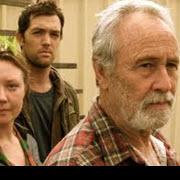Theatrework’s presentation of an If Theatre production of Daniel Keene’s The Nightwatchman reminds us to consider why we go to the theatre or should we just stay at home and read the play. The theatre, like the arena, the card table or the tennis court, as Johan Huizinga reminds us is ‘in form and function (a) playground ie.. forbidden sports, isolated, hedged round, hallowed… all are temporary worlds within the ordinary world dedicated to the performance of an act apart.”
Keene’s The Nightwatchman is not a particularly theatrical or dramatic play – not that this is a bad trait. It is lyrical work in two acts. Set in a backyard garden, a family gathers at the family home on the eve of the house being sold prior to the father, Bill, moving to a retirement village. The text moves in lyrical phrases and the shifts in time and action are minimal – perhaps a day, a night and an evening. The problem then arises when this gentle piece is given a particularly un-theatrical direction and served with understated performances. This then begs us to consider – why are we in a theatre? When the sense of play is removed – where actors shift around in semi-darkness with barely audible projection, not only are we not served with the act apart but, we are not invited to participate.
Bill, (Roger Oakley) is blind. He has from my vantage point, been directed – not to play blind – which – had I not researched the play before going I would not have made this assumption.
His daughter, Helen (Zoe Ellerton-Ashley) and his son Michael (Brad Williams) gather together to say goodbye to the family home. The play asks us to reconsider the place of memories and possessions in our lives and most poignantly in family life. Bill is disinterested in possessions – he has sold the family home, owned by his father contents included – at a price, which is, of little consequence to him. He has, by his daughter’s estimation left this earth. There is no room for sentimentality. By selling the house with all its goods he is deleting his life and his memories.
The message, as we are to learn later is not that he has demoted his memories, of his love of his family – simply that they are carried within him.
So, as the inventory of the goods and chattels are taking place inside, the three remaining members of the family take refuge in the back garden where the refrain of the cherry tree reminds them of former, happy family snapshots.
The metaphor of blindness and refuge take precedence. Michael hides behind his camera lens – he is a peripatetic photographer, restless in the world and uncommitted to taking roots. Helen hides behind the altar of an unhappy marriage. Bill has long given up – and for most of his life has been unable to examine his life – his own unhappy marriage and the premature death of his wife. His salvage is alcohol – and the red wine becomes the holy sacrament, the only panacea, it seems to bind this family at the end. The Nightwatchman is suggestive. It asks us to consider family memories – what really happened when we were growing up – and to accept the present as the only reality. Memories, Daniel Keene teaches us memories cannot be touched or placed in the box.
The Nightwatchman
Season: 24 November – 12 December, 2010
For more information on The Nightwatchman visit the ArtsHub Events page.





